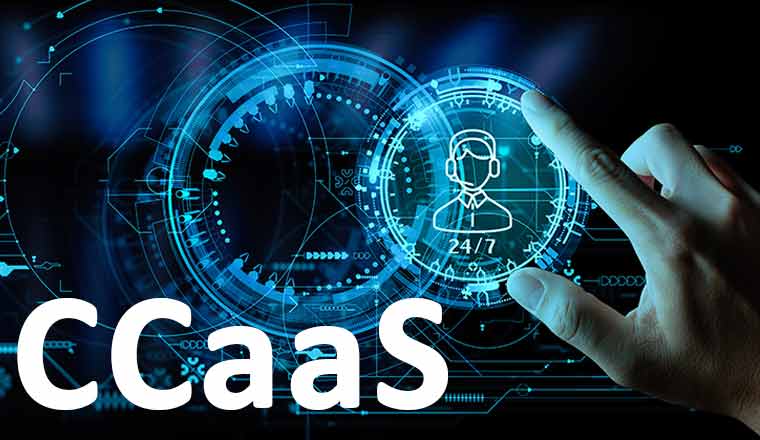Customer preferences and communication channels are constantly evolving, the concept of Customer Engagement has taken center stage. In this pursuit of meaningful interactions and seamless communication, a revolutionary approach has emerged: Contact Center as a Service (CCaaS). This crucial shift has not only redefined how businesses connect with their customers but has also unlocked a new realm of possibilities for enhancing customer experiences.
According to Sprinklr, the global CCaaS market is set to almost TRIPLE in value in the next 5 years.
Understanding CCaaS
Contact Center as a Service (CCaaS) represents a standard shift in the realm of contact centers. Unlike traditional setups that rely on on-premises infrastructure, CCaaS operates entirely through the cloud. This means that customer service representatives can effectively handle inquiries, issues, and interactions from virtually anywhere, as long as they have an internet connection.
Key Features of CCaaS
1. Scalability: CCaaS brings unique flexibility to the table. Businesses can easily scale their operations up or down based on fluctuations in customer demand. This adaptability ensures that the right number of agents are available to address customer inquiries efficiently.
2. Omnichannel Communication: A significant advantage of CCaaS is its support for various communication channels. Voice calls, emails, chat, and social media interactions are seamlessly integrated, allowing customers to reach out through their preferred channel without losing context.
3. Analytics and Insights: CCaaS empowers businesses with valuable insights through data analytics. Call volumes, customer sentiment, and issue resolution rates can be analyzed to make informed decisions, refine strategies, and improve overall customer experience.
The Benefits of CCaaS Implementation
1. Enhanced Customer Experiences: CCaaS places customer experience at the forefront of its offerings. By facilitating omnichannel interactions, customers can effortlessly switch between communication channels while maintaining the context of their conversations. This personalized approach enhances satisfaction and provides customer loyalty.
2. Cost-Efficiency : Conventional contact centers involve significant investments in infrastructure, hardware, and ongoing maintenance. CCaaS eliminates these financial burdens by operating in the cloud server. As a result, companies can redirect these resources toward other critical aspects of their business.
3. Flexibility and Scalability: CCaaS’s adaptable nature aligns with the fluctuating demands of modern business. As customer preferences evolve, and seasonal patterns emerge, companies can seamlessly adjust their agent count without the hardware complexities associated with physical equipment.
4. Streamlined Management : The cloud-based approach of CCaaS simplifies management processes. Software updates, maintenance, and integrations can be executed centrally, reducing the administrative interference associated with managing multiple physical locations.
5. Access to Advanced Technology : CCaaS providers continually enhance their platforms with cutting-edge technology. Companies leveraging CCaaS can harness these advancements without the need for extensive hardware upgrades. This ensures that businesses stay at the forefront of customer engagement solutions.
Implementing CCaaS: Steps and Considerations
1. Needs Assessment : Before embracing CCaaS, a thorough assessment of the company’s requirements is essential. Factors such as the size of the customer base, the complexity of interactions, and the most frequently used communication channels should be evaluated to ensure a seamless transition.
2. Provider Selection : Selecting the right CCaaS provider is a critical decision. Companies should seek providers with a proven track record of reliability, security, and responsive customer support. Additionally, the platform’s features should align with the company’s goals and customer engagement strategy.
3. Integration with Existing Systems : Seamless integration between CCaaS and existing systems, such as customer relationship management (CRM) software, is pivotal. Compatibility ensures that essential customer data is accessible to agents, providing an efficient support experience.
4. Training and Onboarding : Effective training is crucial to unlock the full potential of CCaaS. Adequate training programs should be implemented to familiarize customer service representatives with the platform’s features and functionalities. This empowers agents to provide efficient and effective customer support.
5. Data Security and Compliance : With the increasing emphasis on data privacy, companies must ensure that the chosen CCaaS provider adheres to the security protocols and compliance standards. Protecting customer information is very crucial in building trust and maintaining the reputation of companies.
6. Monitoring and Continuous Improvement : CCaaS allows businesses to monitor real-time metrics and customer interactions. Regularly reviewing these insights can identify trends, and areas for improvement. This proactive approach facilitates continuous enhancement of customer service strategies.
7. Enhanced Personalization through AI : AI-driven insights will enable CCaaS platforms to analyze customer interactions and preferences more comprehensively. This data can then be used to create highly personalized customer experiences. AI algorithms can suggest solutions, predict customer needs, and recommend relevant products or services, resulting in a more engaging and customized journey for each customer.
The Future of CCaaS: Continual Evolution
As technology advances, CCaaS also evolves with respect to it. The future holds promising developments, including the integration of artificial intelligence (AI) and chatbots. These intelligent tools can handle routine inquiries, allowing human agents to focus on complex interactions that require empathy and problem-solving skills. Moreover, as data security concerns are still a concern, CCaaS providers will continue to strengthen their data protection measures.
Conclusion
Through this article, it becomes evident that CCaaS offers a multifaceted approach to enhancing customer engagement. Its cloud-based nature empowers organizations to surpass traditional limitations, enabling remote access, flexibility, and cost-efficiency. The integration of various communication channels, such as voice, chat, email, and social media, fosters a seamless and consistent experience for customers across different touchpoints.








